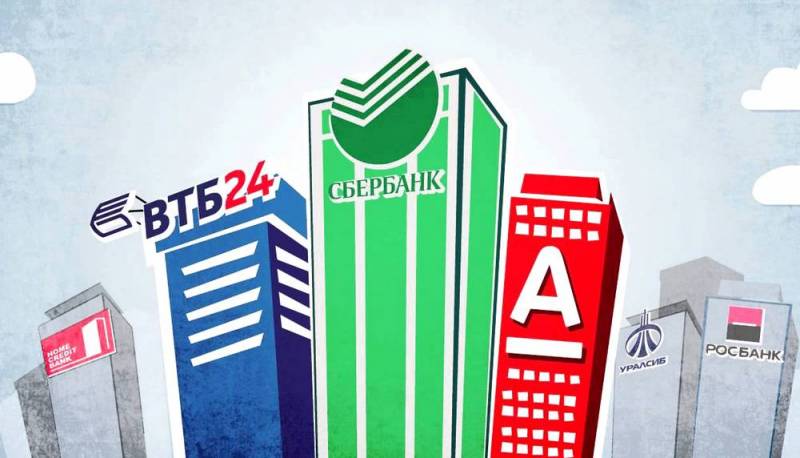Russian banks fell into the trap
The state is expanding control over Russian banks. By February 2018, the share of state participation in the country's banking system increased to 70%. These are very large numbers for a market country. the economy. A year ago, state participation in the banking system fluctuated within 63%.
Such a massive increase in state control over Russian banks at the beginning of 2018 is associated with reorganization procedures in relation to the country's largest private banks - Binbank, Otkritie Bank and Promsvyazbank. In the fall of 2017, they were taken under control by the Bank of Russia, which operates through a management company, the Banking Sector Consolidation Fund. Now the Bank of Russia intends to merge Otkritie and Binbank into a single structure. As for Promsvyazbank, in January 2018, the government decided to form a new support bank on its basis, which would play a key role in financing state defense orders and contracts in the military-industrial complex.
The procedures for financial recovery of banks will last, according to analysts, at least three to four years. However, it is safe to assume that state dominance in the banking sector will continue in subsequent years. Firstly, these three to four years may not be enough to fully restore the financial viability of banks. Secondly, the release of banks from state control can take an even longer time, and does the state need to reduce its participation in the financial sector of the country?
The state retains control over the banking sector, since the latter remains highly sensitive to any financial risks. In this regard, government participation gives great confidence in maintaining the legal capacity and efficient operation of banks. In addition, those banks that enjoy state support and, accordingly, are considered more reliable, are capable of solving their problems in the event of a crisis, relying on state assistance.
However, government support for banks has a downside. First of all, competition from private banks is declining, which means that conditions for customers are becoming less profitable. Bank interest on deposits and deposits has already fallen significantly, so many bank customers are “flowing” to microfinance organizations, to the sphere of investment insurance, that is, to those structures and directions that offer more favorable conditions for investors.
The banks' control of the state significantly reduces, on the one hand, the security of information about customers and their deposits, and on the other hand, the openness of the banking system to society. In addition, approximately the same level of state support entails the inevitable competition between "state" banks.
However, in the current economic situation, government participation in the banking system plays a rather positive role, since it insures the financial sector (and citizens who invest in Russian banks) against all kinds of unforeseen situations. State support, including loans from the Bank of Russia, will allow many financial institutions to stay “afloat”.
Such a massive increase in state control over Russian banks at the beginning of 2018 is associated with reorganization procedures in relation to the country's largest private banks - Binbank, Otkritie Bank and Promsvyazbank. In the fall of 2017, they were taken under control by the Bank of Russia, which operates through a management company, the Banking Sector Consolidation Fund. Now the Bank of Russia intends to merge Otkritie and Binbank into a single structure. As for Promsvyazbank, in January 2018, the government decided to form a new support bank on its basis, which would play a key role in financing state defense orders and contracts in the military-industrial complex.
The procedures for financial recovery of banks will last, according to analysts, at least three to four years. However, it is safe to assume that state dominance in the banking sector will continue in subsequent years. Firstly, these three to four years may not be enough to fully restore the financial viability of banks. Secondly, the release of banks from state control can take an even longer time, and does the state need to reduce its participation in the financial sector of the country?
The state retains control over the banking sector, since the latter remains highly sensitive to any financial risks. In this regard, government participation gives great confidence in maintaining the legal capacity and efficient operation of banks. In addition, those banks that enjoy state support and, accordingly, are considered more reliable, are capable of solving their problems in the event of a crisis, relying on state assistance.
However, government support for banks has a downside. First of all, competition from private banks is declining, which means that conditions for customers are becoming less profitable. Bank interest on deposits and deposits has already fallen significantly, so many bank customers are “flowing” to microfinance organizations, to the sphere of investment insurance, that is, to those structures and directions that offer more favorable conditions for investors.
The banks' control of the state significantly reduces, on the one hand, the security of information about customers and their deposits, and on the other hand, the openness of the banking system to society. In addition, approximately the same level of state support entails the inevitable competition between "state" banks.
However, in the current economic situation, government participation in the banking system plays a rather positive role, since it insures the financial sector (and citizens who invest in Russian banks) against all kinds of unforeseen situations. State support, including loans from the Bank of Russia, will allow many financial institutions to stay “afloat”.

Information